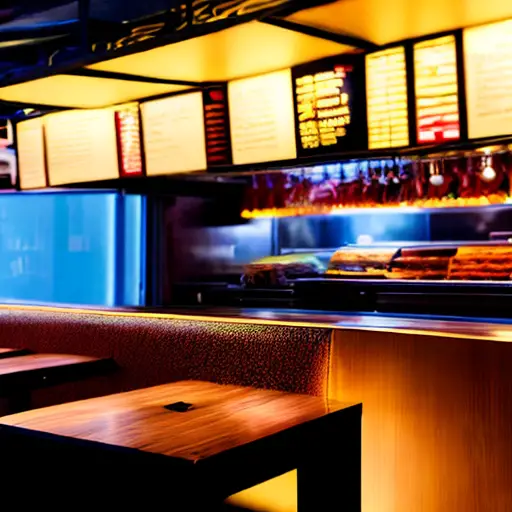Understanding Halal: Unveiling the Concept of Halal Restaurants
Understanding Halal is essential when exploring the essence of a Halal restaurant. Halal refers to what is permissible or lawful in Islamic law, and a Halal restaurant is one that adheres to these guidelines in its food preparation and service. This means that the ingredients used, the methods of cooking, and even the utensils must all be Halal-certified. By ensuring that everything served is Halal, these restaurants provide a dining experience that is not only delicious but also in line with the religious beliefs of Muslim customers. This attention to detail and commitment to authenticity is what sets Halal restaurants apart and makes them a popular choice for those seeking Halal options.
Halal Certification: Ensuring Authenticity and Compliance in Halal Restaurants
An interesting fact about halal restaurants is that they not only cater to the dietary needs of Muslims but also attract a diverse range of customers. Many non-Muslims choose to dine at halal restaurants due to the emphasis on high-quality ingredients, strict hygiene standards, and the absence of additives or preservatives in the food. This has led to the popularity of halal cuisine spreading beyond the Muslim community, making it a global culinary trend.
Halal certification plays a crucial role in ensuring authenticity and compliance in Halal restaurants. This certification is granted by recognized Islamic authorities after a thorough inspection of the restaurant's practices and procedures to verify that they meet the Halal requirements. By obtaining this certification, a Halal restaurant demonstrates its commitment to serving food that is not only delicious but also prepared in accordance with Islamic dietary laws. Customers can dine with confidence, knowing that the food they are consuming is Halal-certified and meets the highest standards of quality and integrity. This certification process helps to build trust and credibility, making Halal restaurants a reliable choice for those seeking Halal options.
Halal Dietary Restrictions: Exploring the Principles and Guidelines

Halal dietary restrictions are based on Islamic principles and guidelines that dictate what is permissible for Muslims to consume. In the context of a Halal restaurant, these restrictions are strictly followed to ensure that all food served is in compliance with these rules. One of the key principles of Halal dietary restrictions is the prohibition of consuming pork and its by-products, as well as any meat that is not slaughtered in accordance with Islamic law. This means that Halal restaurants do not serve dishes containing pork or non-Halal meat, and they take great care in sourcing their ingredients to guarantee their compliance with these guidelines.
Another important aspect of Halal dietary restrictions is the requirement for meat to be slaughtered in a specific way known as 'Zabiha'. This method involves pronouncing the name of Allah at the time of slaughter and ensuring that the animal is killed swiftly to minimize its suffering. Halal restaurants adhere to this practice by sourcing their meat from Halal-certified suppliers and ensuring that all meat served has been prepared in accordance with these guidelines. By following these principles, Halal restaurants provide customers with the assurance that the meat they are consuming is not only delicious but also ethically and religiously permissible.
In addition to restrictions on meat, Halal dietary guidelines also extend to other food categories such as beverages and additives. For example, alcohol is strictly prohibited in Islam, and as such, Halal restaurants do not serve any alcoholic beverages. They also pay close attention to the ingredients used in their dishes, avoiding any additives or flavorings that may contain non-Halal components. By upholding these dietary restrictions, Halal restaurants offer a dining experience that is not only flavorful but also aligned with the religious beliefs and values of their Muslim customers.
Overall, Halal dietary restrictions are rooted in the principles of Islamic law and serve as a guide for Muslims seeking to maintain a Halal lifestyle. In the context of a Halal restaurant, these restrictions are meticulously followed to ensure that all food served is Halal-certified and compliant with these guidelines. By upholding these principles, Halal restaurants provide a space where customers can enjoy delicious and ethically sourced meals that align with their religious beliefs and dietary requirements.
Halal Restaurant Experience: Embracing Diversity and Catering to All
A fun fact about halal restaurants is that they not only cater to Muslim dietary restrictions but also offer a wide variety of delicious and diverse cuisines from around the world. So, even if you don't follow halal guidelines, you can still enjoy a scrumptious meal at a halal restaurant!
The Halal restaurant experience goes beyond just serving Halal-certified food; it also embraces diversity and caters to a wide range of dietary preferences and restrictions. In addition to offering Halal options, many Halal restaurants also provide vegetarian, vegan, and gluten-free dishes to accommodate customers with different dietary needs. This inclusive approach ensures that everyone can enjoy a delicious meal together, regardless of their dietary restrictions. By embracing diversity and catering to all, Halal restaurants create a welcoming and inclusive dining environment that celebrates the richness of different culinary traditions.

